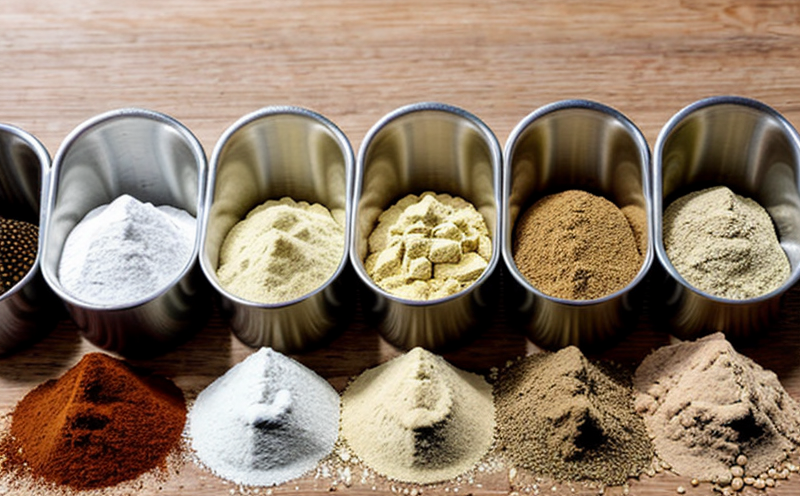EN 36927 Antioxidant Stability Analysis in Dairy Premixes
The European Standard EN 36927 specifies a method for determining the antioxidant stability of antioxidants present in dairy premixes. This standard is crucial for ensuring that feed additives, particularly antioxidants like vitamin E and selenium, maintain their efficacy during storage and usage.
Dairy premixes are complex mixtures containing various nutrients, vitamins, minerals, and other components that support the nutritional requirements of ruminants such as cows, sheep, and goats. Antioxidants play a vital role in stabilizing these feed additives by preventing oxidative degradation, which can lead to nutrient loss and reduced effectiveness.
The process outlined in EN 36927 involves several steps, including sample preparation, extraction of antioxidants from the premix, and analysis using high-performance liquid chromatography (HPLC) or other suitable techniques. The stability is assessed by monitoring changes in antioxidant levels over time under controlled conditions that mimic real-world storage scenarios.
This method ensures that feed additive manufacturers can demonstrate compliance with regulatory requirements and provide reliable products to farmers and livestock producers. By adhering to this standard, laboratories can offer consistent results that are recognized across Europe and internationally, enhancing trust in the industry.
The importance of antioxidant stability cannot be overstated, especially for dairy premixes. Oxidative stress caused by high levels of unsaturated fats and oils in these feeds can lead to degradation of antioxidants like tocopherols and ascorbic acid. This degradation not only reduces the nutritional value but also impacts animal health and productivity.
Compliance with EN 36927 is mandatory for manufacturers and suppliers who wish to sell their products within the European Union. It ensures that all stakeholders involved in the production, distribution, and consumption of dairy premixes have access to high-quality, stable feed additives.
The standard covers various aspects such as sample collection, storage conditions, extraction procedures, analytical methods, and interpretation of results. Laboratories performing this analysis must adhere strictly to these guidelines to ensure accurate and reliable outcomes.
For laboratories specializing in food and feed testing, particularly those focusing on dairy premixes, mastering the techniques described in EN 36927 is essential. This not only enhances their reputation but also allows them to offer comprehensive services tailored to meet the needs of different clients.
In conclusion, EN 36927 plays a pivotal role in maintaining the quality and effectiveness of antioxidants used in dairy premixes. By ensuring consistent results through rigorous testing procedures, laboratories contribute significantly to the overall success of the livestock industry.
Benefits
Adhering to EN 36927 provides numerous benefits for stakeholders in the dairy premix industry. Firstly, it ensures that antioxidants used remain stable throughout their shelf life, preserving their nutritional value and efficacy.
The standard also helps manufacturers comply with regulatory requirements, thereby avoiding potential legal issues and fines. For procurement teams, this means better-informed decisions when selecting suppliers, leading to higher-quality products at competitive prices.
From an environmental perspective, stable antioxidants mean less waste generation due to ineffective feed additives. This contributes positively towards sustainability efforts by reducing resource consumption and minimizing environmental impact.
In terms of animal welfare, ensuring the stability of antioxidants supports healthier animals by providing them with optimal nutrition. This leads to improved milk production in dairy herds, better meat quality in livestock, and enhanced overall well-being.
For research and development (R&D) teams, compliance with EN 36927 offers valuable insights into the behavior of antioxidants under various conditions. This knowledge can be used to innovate new formulations or improve existing ones, driving continuous improvement within the industry.
Industry Applications
- Dairy Premix Manufacturers: Ensuring product quality and compliance with regulations.
- R&D Engineers: Developing new antioxidant formulations or improving existing ones.
- Quality Managers: Monitoring the stability of antioxidants in dairy premixes to maintain consistent product quality.
- Compliance Officers: Verifying adherence to EU standards for feed additives.
- Procurement Teams: Evaluating suppliers based on their ability to meet EN 36927 requirements.
Environmental and Sustainability Contributions
The use of stable antioxidants in dairy premixes supports environmental sustainability by reducing waste generation. By preventing the breakdown of feed additives, these antioxidants help maintain optimal nutrition levels for animals, which is crucial for efficient food production.
In addition to waste reduction, stable antioxidants contribute to resource efficiency by ensuring that all nutrients are utilized effectively. This minimizes unnecessary inputs while maximizing output, thereby promoting sustainable agricultural practices.
Moreover, the stability of antioxidants also helps in reducing greenhouse gas emissions associated with inefficient feed usage. By providing consistent and effective nutrition to livestock, stable antioxidants support higher productivity rates, which can lead to lower per-unit emissions over time.
The implementation of EN 36927 contributes significantly to these environmental benefits by mandating rigorous testing protocols that guarantee the stability of antioxidants used in dairy premixes. This not only enhances product quality but also promotes responsible use practices within the industry.





